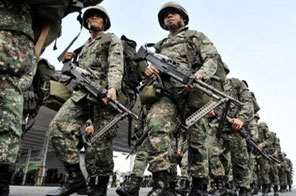Philippine army says Abu Sayyaf killing major blow
MANILA: The Philippine military said Monday its killing of a "ruthless" Abu Sayyaf commander inflicted a big blow on the Al Qaeda-linked network, as it pursued his fellow militants on a remote island.
The military reported it shot dead six Abu Sayyaf members in the jungles of lawless Jolo island on Sunday, including Albader Parad, who was the subject of a US government bounty.
"It is a big blow in the sense that he (Parad) is a very notorious and ruthless leader," Lieutenant General Benjamin Dolorfino, head of military forces in the south, told AFP by telephone.
"He always played a big role as far as the effectiveness and capability of the group is concerned and the group always reflects the personality of the leader."
Parad is alleged to have led an Abu Sayyaf cell that kidnapped and threatened to behead three Red Cross workers on Jolo last year, before releasing them after many months.
The Abu Sayyaf was was set up in the 1990s with seed money from Osama bin Laden's Al-Qaeda network, according to the Philippine military, and has been blamed for the nation's worst terrorist attacks.
These include the bombing of a passenger ferry in Manila Bay that killed over 100 people in 2004, as well as many kidnappings of foreigners and Filipinos in the Muslim-populated south of the country where it is based.
Dolorfino said one of the other Abu Sayyaf members slain on Sunday was the son of Umbra Jumdail, also known as "Dr Abu," who is believed to be one of the group's top two leaders.
He said the killing of Jumdail's son may indicate that the leader himself was also nearby, and soldiers on Jolo were pursuing Abu Sayyaf members on Monday in a bid to capitalise on the previous day's success.
Dolorfino said Sunday's killings, which occurred after the military acted on information provided by informants, gave hope that the Abu Sayyaf could finally be crushed.
"Without the leaders, the members will be directionless and, if no new leader emerges, they may crumble," said Dolorfino.
However, although the Abu Sayyaf is believed to have only a few hundred active members, it has continued to be a threat in the southern Philippines and its militants have killed dozens of Filipino soldiers in recent years.
The Abu Sayyaf has also shown the ability to regain strength and conduct attacks after key leaders were killed or captured.
But Dolorfino said there were no signs of significant new leaders emerging.
"We have not seen any new member who has the reputation of the current leaders. We have not seen any influential sub-leaders who might take the leadership when the current leaders are neutralised," he said.






